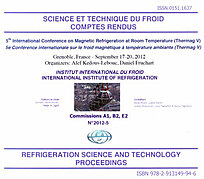
Document IIF
Une étude sur le potentiel de transport de chaleur fondamental d'un réfrigérateur magnétique à bord d'un véhicule.
A study on the fundamental heat transport potential of an in-vehicle magnetic refrigerator.
Numéro : sect. 3
Auteurs : TASAKI Y., TAKAHASHI H., YASUDA Y., et al.
Résumé
The power consumption of an air conditioner in an electric vehicle has a considerable impact on the cruising range. A high-performance magnetic refrigerator is therefore one of the important technologies needed for future electric vehicles. The requisite conditions for an in-vehicle magnetic refrigerator are higher with respect to cooling power density, temperature difference between the hot and cold sides, transient properties, and coefficient of performance than those of household refrigerators or home air-conditioners. To date, a number of experimental and computational studies have been presented concerning magnetic refrigeration models in which heat derived from the magnetocaloric effect is transported between cold side and hot side heat baths by means of a refrigerant. The authors have devised a model without a refrigerant in which heat is transported from the cold to the hot side through well-controlled thermal switches. The heat transport characteristics were investigated under an ideal condition and compared with those of a conventional model that included a refrigerant. The concept and main features of this new model that operates without a refrigerant are described.
Documents disponibles
Format PDF
Pages : 445-452
Disponible
Prix public
20 €
Prix membre*
Gratuit
* meilleur tarif applicable selon le type d'adhésion (voir le détail des avantages des adhésions individuelles et collectives)
Détails
- Titre original : A study on the fundamental heat transport potential of an in-vehicle magnetic refrigerator.
- Identifiant de la fiche : 30005592
- Langues : Anglais
- Source : 5th International Conference on Magnetic Refrigeration at Room Temperature (Thermag V). Proceedings: Grenoble, France, September 17-20, 2012.
- Date d'édition : 17/09/2012
Liens
Voir d'autres communications du même compte rendu (70)
Voir le compte rendu de la conférence
Indexation
-
Thèmes :
Transfert de chaleur;
Conditionnement d'air mobile;
Froid calorique (froid magnétocalorique, électrocalorique, élastocalorique et barocalorique) - Mots-clés : Réfrigerateur magnétique; Froid magnétocalorique; Conditionneur d'air; Transfert de chaleur; Modélisation; Magnétisme; Effet magnétocalorique; Conditionnement d'air
-
Estimation of cooling characteristics of AMR-ty...
- Auteurs : KAWANAMI T., HIRANO S., HIRANO N., et al.
- Date : 17/02/2010
- Langues : Anglais
- Source : Measures to address climate change. 2010 International Symposium on Next-generation Air Conditioning and Refrigeration Technology: February 17-19, Tokyo, Japan.
- Formats : PDF
Voir la fiche
-
Modeling of in-vehicle magnetic refrigeration.
- Auteurs : OLSEN U. L., BAHL C. R. H., ENGELBRECHT K., et al.
- Date : 17/09/2012
- Langues : Anglais
- Source : 5th International Conference on Magnetic Refrigeration at Room Temperature (Thermag V). Proceedings: Grenoble, France, September 17-20, 2012.
- Formats : PDF
Voir la fiche
-
New permanent magnet configurations for magneti...
- Auteurs : BOUCHEKARA H. R. E., KEDOUS-LEBOUC A., YONNET J. P.
- Date : 23/08/2010
- Langues : Anglais
- Source : 4th International Conference on Magnetic Refrigeration at Room Temperature (Thermag IV). Proceedings: Baotou, China, August 23-27, 2010.
- Formats : PDF
Voir la fiche
-
Design of an electrical machine for an integrat...
- Auteurs : KIEFFER C., GUSTIN F., GIURGEA S., et al.
- Date : 17/09/2012
- Langues : Anglais
- Source : 5th International Conference on Magnetic Refrigeration at Room Temperature (Thermag V). Proceedings: Grenoble, France, September 17-20, 2012.
- Formats : PDF
Voir la fiche
-
Recent development of magnetic refrigerant mate...
- Auteurs : WADA H., SADAMATSU K., MUTSUKI N., et al.
- Date : 17/02/2010
- Langues : Anglais
- Source : Measures to address climate change. 2010 International Symposium on Next-generation Air Conditioning and Refrigeration Technology: February 17-19, Tokyo, Japan.
- Formats : PDF
Voir la fiche
